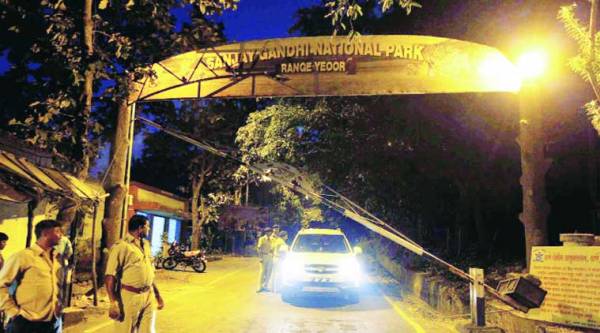 Authorities have written to the Central Zoo Authority.
Authorities have written to the Central Zoo Authority.
Express News Service | Mumbai | Posted: November 17, 2014
A 13-year-old female leopard died at the Sanjay Gandhi National Park
(SGNP) at Borivali on Saturday. The relatively healthy Nethra’s death
has sparked panic among forest officials, who have written to the
Central Zoo Authority (CZA) seeking expert help to investigate reasons
for deaths and suggest measures.Nethra is the third leopard and fourth big cat in captivity to have died in two months at the national park.
Nethra was brought to the park from Ahmednagar rescue centre in 2007 at the age of six. She was found dead around 7.45 am on Saturday. “It was a sudden death. We were informed that Nethra was silent on Friday and we had shifted her to the medical cage for further investigation. But before we could investigate, she died. Post-mortem report indicated minor haemorrhages in the intestine and accumulation of fluid in the abdomen. Being a younger leopard, her death is a cause for concern and we are sending samples to a Bareilly institute for further investigation,” said Dr Yuvraj Kaginkar, consulting vet at the park.
Another female leopard is currently kept in a medical cage and is undergoing treatment as she has not eaten for four-five days, said officials from the park.
Samples from Nethra and the sick leopard are being sent to Indian Veterinary Research Institute (IVRI) at Bareilly, Uttar Pradesh, to conduct a detailed study on cause of death.
Meanwhile, officials met with experts from Bombay Veterinary College and have decided to seek advice from wildlife experts on saving the remaining animals. “We have requested CZA to send experts to visit the animals and suggest some preventive and curative measures. Even if some of the deaths can be attributed to old age, so many leopards dying one after another raises a concern and I want to rule out any virus attack and want to know what more can be done to keep the animals healthy,” said Vikas Gupta, chief conservator of forests, SGNP.
According to the vet, in captivity, leopards survive up to 15 years, while in the wild, they live up to seven-eight years. Following animal deaths, vets have put four overweight leopards on a low fat diet. “We remove fat from the meat served to them and have reduced the quantity by 10 per cent for the slightly overweight leopards,” said Kaginkar.
source
No comments:
Post a Comment